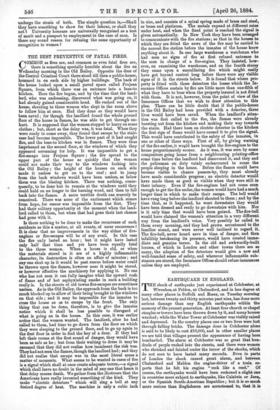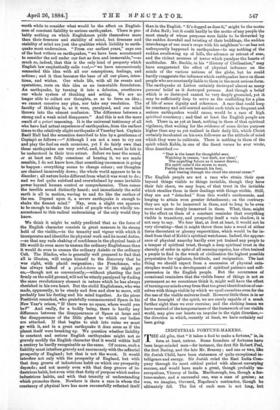EARTHQUAR Pi IN ENGLAND. T HE shock of earthquake just experienced
at Colchester, at Wivenhoe, at Peldon, at Chelmsford, and in less degree at many other places in Suffolk and Essex, on Tuesday morning last, between twenty and thirty minutes past nine, has done more serious damage than any English earthquake within the memory of the present generation. At least four church or chapel steeples or towers have been thrown down by it, and many houses wrecked; while the Water Tower at Colchester was visibly raised and depressed. In the country places one or two lives were lost through falling bricks. The damage done in Colchester alone is said to be likely to cost £10,000, and in other smaller places we are told that villages present the appearance of having been bombarded. The alarm at Colchester was so great that hun- dreds of people rushed into the streets, and there were women who shrieked and fainted under the terror of the shocks, which do not seen to have lasted many seconds. Even in parts of London the shock caused great alarm, and between Chelmsford and Malden the engine-driver of a train re- ports that he felt his engine " rock like a reed." Of course, the earthquake would have been reckoned a slight one in countries more subject to earthquake, like Calabria or Java, or the Spanish South-American Republics ; but it is so muck more serious than Englishmen are accustomed to, that it is worth while to consider what would be the effect on English- men of constant liability to serious earthquakes. There is pro- bably nothing on which Englishmen pride themselves more than their firmness and stability of mind, but firmness and stability of mind are just the qualities which liability to earth- quake most undermines. "From our earliest years," says one of the best writers on earthquakes, " we have been accustomed to consider the soil under our feet as firm and immovable,"—so much so, indeed, that this is the only kind of property which English law emphatically calls real,—" we have unconsciously connected this idea with all our conceptions, feelings, and actions ; and it thus becomes the base of all our plans, inten- tions, and wishes. Our whole life, with all its events and operations, rests on this idea as an immutable foundation. An earthquake, by turning it into a delusion, overthrows our whole system of thinking and acting. We are no longer able to collect our thoughts, so as to form an idea ; we cannot conceive any plan, nor take any resolution. The faculty of thinking is, as it were, paralysed, and our mind thrown into the utmost confusion. The difference between a strong and a weak mind disappears." And this is not the mere result of a priori reasoning. It is the universal testimony of all who have had actual experience of earthquakes, from the earliest times to the relatively slight earthquake of Tuesday last. Captain Basil Hall had the sensation described to him by a gentleman of Copiapb as follows :—" Although I a m not a man to cry out and play the fool on such occasions, yet I do fairly own that these earthquakes are very awful, and, indeed, must be felt to be understood in their true extent. Before we hear the sound, or at least are fully conscious of hearing it, we are made sensible, I do not know how, that something uncommon is going to happen : everything seems to change colour ; our thoughts are chained immovably down ; the whole world appears to be in disorder ; all nature looks different from what it was wont to do ; and we feel quite subdued and overwhelmed by some invisible power beyond human control or comprehension. Then comes the terrible sound distinctly heard ; and immediately the solid earth is all in motion, waving to and fro like the surface of the sea. Depend upon it, a severe earthquake is enough to shake the firmest mind." Nay, even a slight one appears to be enough to shake the minds of people who are wholly un- accustomed to this radical undermining of the only world they know.
We think it might be safely predicted that as the force of the English character consists in great measure in its strong hold of the visible,—in the tenacity and vigour with which it incorporates and identifies its physical work and its moral duties, —so that any rude shaking of confidence in the physical basis of life would do even more to unman the ordinary Englishman than it would do even to unman the ordinary Asiatic or the ordinary Celt. The Hindoo, who is generally well prepared to find that all is illusion, will resign himself to the discovery that he was right, with placid resignation ; the Frenchman, who has always talked of a pied-a-terre as if life might go on,—though not so conveniently,—without planting the feet firmly on the solid ground, will not be utterly paralysed by finding the same revolutionary element in nature which he has always cherished in his own heart. Bnt the stolid Englishman, who was made, apparently, to be steady and firm and slow to move, will probably lose his footing and his mind together. As the pions Positivist remarked, who gratefully commemorated Space in his New Year's orison, " If there were no space, where would you be P" And really, for a bodily being, there is hardly any difference between the disappearance of Space at large and the disappearance of the little planet to which our bodies are attached. If that begins to sink into ruins we must go with it, and in a great earthquake it does seem as if the planet itself were breaking up. We question whether liability to constant and serious English earthquakes might not so gravely modify the English character that it would within half a century be hardly recognisable as the same. Of course, such a liability must interfere gravely and enormously with the material prosperity of England ; but that is not the worst. It would interfere not only with the prosperity of England, but with that deep groove of industrious habit on which our prosperity depends ; and not merely even with that deep groove of in- dustrious habit, but even with that fixity of purpose which makes industrious habits, and with that tenacity of understanding which promotes them. Nowhere is there a race in whom the constancy of physical laws has more successfully reflected itself than in the English. " It's dogged as does it," might be the motto of John Bull ; but it could hardly be the motto of any people the most steady of whose purposes were liable to be thwarted by the sudden downfall and twisting of their buildings, the sudden interchange of one man's crops with his neighbour's—as has not unfrequently happened in earthquakes—to say nothing of the sudden swallowing up of hills, the advance or retreat of seas, and the violent accesses of terror which paralyse the hearts of multitudes. Mr. Buckle, in his "History of Civilisation," may have exaggerated the effect of physical influence on the minds of the various nations of the globe, but he could hardly exaggerate the influence which earthquakes have on those people who are constantly liable to them in the most serious form.
The earthquake at Lisbon certainly destroyed almost as many persons' belief as it destroyed persons. And though a belief which is so destroyed cannot be very deeply grounded, yet it may be sufficiently deep to servo as the scaffolding for a plan of life of some dignity and coherence. A race that could keep its constancy and self-control amidst such trials as frequent and serious earthquakes would cause, would be a race of high spiritual constancy ; and that at least the English people are not. There is, as yet at least, nothing in them of that spiritual vigilance, that waiting for the evidence of some divine purpose higher than any as yet realised in their daily life, which Christ certainly inculcated on his own followers as the attitude of mind
which they were to cultivate. There is nothing in them of the spirit which Keble, in one of the finest verses he ever wrote, thus described :—
" That is the heart for thoughtful seer,
Watching in trance, 'nor dark, nor clear,' The appalling future as it nearer draws ; His spirit calm'd the storm to meet, Feeling the rock beneath his feet,
And tracing through the cloud the eternal cause."
The English people are not a race who strain their eyes beyond things visible to things invisible, though they have their fair share, we may hope, of that trust in the invisible which steadies them in their dealings with things visible. Still, they are not " detached" from this world's excitements, and longing to attain even greater detachment; on the contrary; they are apt to be immersed in them, and to long to be even more and more deeply immersed in them. What, then, might be the effect on them of a constant reminder that everything visible is transitory, and prosperity itself a vain shadow, it is not easy to say. We fear that, at first at least, it would not be very elevating—that it might throw them into a mood of either fierce discontent or gloomy superstition, which would be far in. deed from that of Keble's spiritual watchman. Indeed, the appear-
ance of physical anarchy hardly ever yet trained any people to a temper of spiritual trust, though a deep spiritual trust in the eternity of order in spite of all seeming caprice, has often trained
a people to find in the wreck of civilisation the highest possible preparation for vigilance, fortitude, and resignation. The last thing we should expect from a succession of physical cata- strophes would be a development of spiritual patience and self- possession in the English people. But the occurrence of occasional reminders that the visible frame of things is not so permanent as we sometimes think it, might well have the effect of turning our minds away from that too great identification of our- selves with things visible by which we spoil ourselves even for the due use of the visible universe itself. However little there is in us of the foresight of the spirit, we are surely capable of a much. further sight than we ever exercise; and the striking lesson we have received of the temporariness of the framework of our visible world, may give our hearts an impulse in the right direction,— the direction in which, recently at least, we have certainly net
been going.



































 Previous page
Previous page